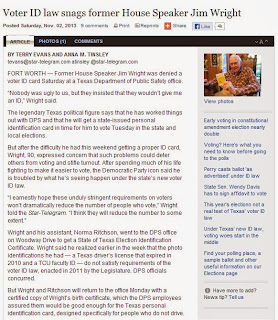The Fort Worth Weekly and Mary Kelleher do a good job at putting the new Water District employee in perspective.
“If what the TRWD is hiring him to do is to help it be more transparent and accountable to the taxpayers, I think that would be great,” she said. “I’m hopeful he will be helpful in convincing the administration that they work for the taxpayers and [that] the taxpayers are entitled to know what is going on.”
Kelleher sees some positive changes. Water district staff have begun posting online videos of board meetings and publicizing some committee meetings. The staff is considering testing the Trinity’s water quality once a week, rather than once a month, and publishing the results. And more seating has been made available for visitors at board meetings.
However, Kelleher’s hope dimmed when she realized that she’d run across Fischer’s name a few days before. On Nov. 5 she had submitted a public information request seeking what she considered basic information on district records. She received a response from Fischer 10 days later, on his Austin law firm’s letterhead.
The response was similar to many of those that residents have received when soliciting public information: in the eyes of Kelleher and others, the runaround.
“At such time as you are able to provide us with your written reply to this letter, for purposes of clarifying or narrowing your request, we will attempt to respond to your clarified request at that time,” he wrote.
Kelleher had anticipated such a reply when she submitted the request –– she included a note to Oliver that said, in part, that the water district “has expended extraordinary efforts to deny information to the general public” and used “technicalities to wiggle out of your duties and legal requirements.”
Kelleher now wonders whether Fischer is here to provide transparency or just to act as another obstacle.
“If what the TRWD is hiring him to do is to help it be more transparent and accountable to the taxpayers, I think that would be great,” she said. “I’m hopeful he will be helpful in convincing the administration that they work for the taxpayers and [that] the taxpayers are entitled to know what is going on.”
Kelleher sees some positive changes. Water district staff have begun posting online videos of board meetings and publicizing some committee meetings. The staff is considering testing the Trinity’s water quality once a week, rather than once a month, and publishing the results. And more seating has been made available for visitors at board meetings.
However, Kelleher’s hope dimmed when she realized that she’d run across Fischer’s name a few days before. On Nov. 5 she had submitted a public information request seeking what she considered basic information on district records. She received a response from Fischer 10 days later, on his Austin law firm’s letterhead.
The response was similar to many of those that residents have received when soliciting public information: in the eyes of Kelleher and others, the runaround.
“At such time as you are able to provide us with your written reply to this letter, for purposes of clarifying or narrowing your request, we will attempt to respond to your clarified request at that time,” he wrote.
Kelleher had anticipated such a reply when she submitted the request –– she included a note to Oliver that said, in part, that the water district “has expended extraordinary efforts to deny information to the general public” and used “technicalities to wiggle out of your duties and legal requirements.”
Kelleher now wonders whether Fischer is here to provide transparency or just to act as another obstacle.






















